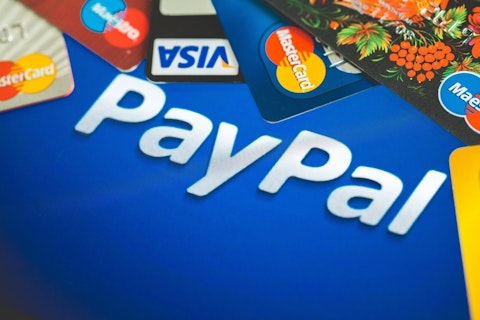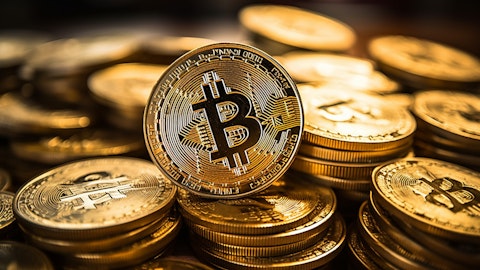We came across a bullish thesis on PayPal Holdings, Inc. (PYPL) on Schwar Capital’s Substack by Schwar Capital. In this article we will summarize the bulls’ thesis on PYPL. PayPal Holdings, Inc. share was trading at $69.35 as of Sept 11th.

www.BillionPhotos.com / Shutterstock.com
PayPal operates a vast and multifaceted e-commerce payment network, with its revenue primarily derived from transaction fees, or “take-rates,” which constitute about 91% of its total income. The company’s core revenue segments include Transaction Revenues and Other Value-added Services, but its business is diversified across multiple platforms with varying take-rates, costs, and growth profiles. The Branded Checkout/Digital Wallet service remains PayPal’s cornerstone, allowing over 429 million users to make payments globally. This segment also features the “Buy Now, Pay Later” (BNPL) option and boasts higher take-rates, contributing significantly to PayPal’s gross profit. Meanwhile, Braintree, acquired in 2013, functions as an unbranded processing platform that serves large enterprises, offering competitive rates but typically at lower take-rates, reflecting its role as a high-volume, low-margin business.
Venmo, a peer-to-peer (P2P) payment service popular among younger consumers, has evolved into a broader financial platform with a focus on monetization through services such as debit and credit cards, instant transfers, and cryptocurrency trading. Although its revenue contribution is still growing, PayPal is working to fully integrate and monetize Venmo alongside its core services. Additionally, PayPal provides other merchant and value-added services, such as payment gateways, fraud prevention tools, analytics, and credit offerings. These services enhance merchant capabilities and add a diverse array of revenue streams, particularly as rising interest rates have made interest income from customer deposits increasingly significant.
Despite a slight decline in PayPal’s total take rate over the past year—down from 1.99% to 1.89%—the company has managed to maintain transaction margins through growth in other areas like Venmo and international operations. The decline is largely driven by the growing prominence of lower-margin services, such as Braintree’s unbranded processing, and increased competition in branded checkout services. However, PayPal’s extensive network effects, brand recognition, and ability to operate across all devices provide a strong competitive moat against formidable competitors like Apple Pay and Stripe.
Financially, PayPal remains robust, with good gross profit margins around 40%, net margins of approximately 15%, and free cash flow (FCF) margins near 21%. The company boasts a 22% return on equity and maintains a conservative debt/equity ratio of 0.63, along with a current ratio of 1.24, reflecting strong financial flexibility. PayPal holds substantial cash reserves of $13.32 per share and continues to strategically buy back shares, with $6 billion committed this year. This financial stability positions PayPal as a healthy company, well-poised for growth under new management.
PayPal’s valuation suggests a significant upside. Under a bull scenario with a 15% EPS growth rate and an 18x price-to-earnings (PE) multiple, the stock could be valued at $124.5 per share. A base scenario with 10% EPS growth and a 16x PE yields a value of $88.5 per share, while a bear scenario with a 5% EPS growth and a 14x PE suggests a floor of $61.5 per share. The current market pricing in the mid-50s to low-60s range appears to undervalue the company, reflecting concerns about competitive pressures that may be overblown. With robust financials, multiple growth drivers like the Fastlane product, and ongoing efforts to monetize its platforms, PayPal presents a compelling investment case with an asymmetric risk/reward profile. The potential for continued growth and operational efficiency makes a 10% EPS growth rate not just plausible but likely, especially as the company leverages its extensive network and consumer trust in a rapidly evolving digital payments landscape.
PayPal Holdings, Inc. is also not on our list of the 31 Most Popular Stocks Among Hedge Funds. As per our database, 87 hedge fund portfolios held PYPL at the end of the second quarter which was 82 in the previous quarter. While we acknowledge the risk and potential of PYPL as an investment, our conviction lies in the belief that some AI stocks hold greater promise for delivering higher returns, and doing so within a shorter timeframe. If you are looking for an AI stock that is more promising than PYPL but that trades at less than 5 times its earnings, check out our report about the cheapest AI stock.
READ NEXT: Analyst Sees a New $25 Billion “Opportunity” for NVIDIA and 10 Best of Breed Stocks to Buy For The Third Quarter of 2024 According to Bank of America.
Disclosure: None. This article was originally published at Insider Monkey.





